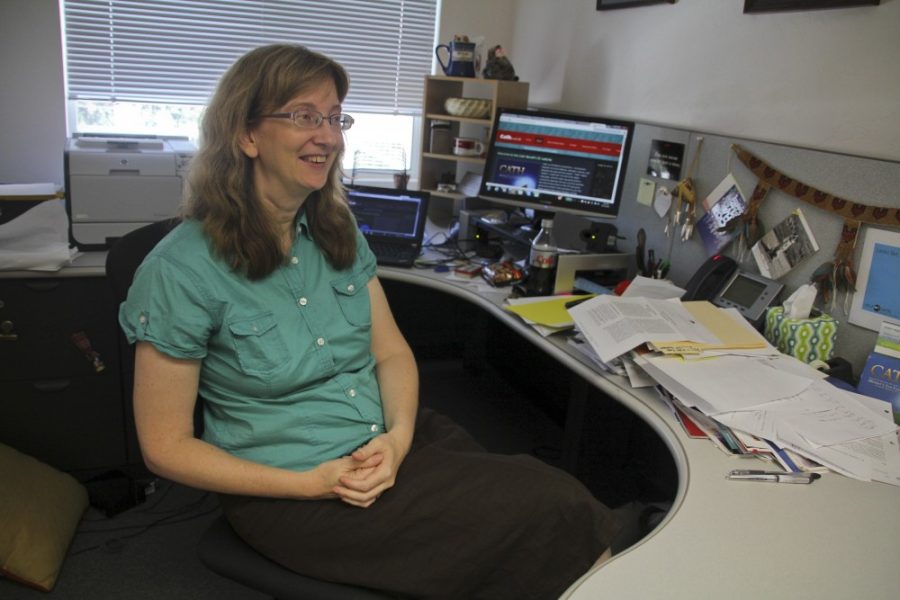Eight years ago, Melissa Tatum was diagnosed with Parkinson’s disease. Instead of letting it define her life, Tatum used her diagnosis as motivation to give back and produce a CD to help fund Parkinson’s research.
Tatum, who works as the director of the UA’s Indigenous Peoples Law and Policy Program, grew up in Plano, Texas and said she always knew she wanted to be a lawyer, despite the fact that she was the first lawyer in her family.
“From the time I was in sixth and seventh grade I was declaring, ‘I’m going to be a lawyer or a judge,’ or something that worked with the law,” Tatum said.
Halfway through her first year of law school, Tatum decided to pursue a career as a professor, and in her second year she stumbled across Indian law, which captured her attention.
She ended up coming to the UA after some time spent codirecting the University of Tulsa’s master’s degree program in Indian Law. She was first hired as the associate director and became the director of Indigenous Peoples Law and Policy in March.
“This is really my dream job,” Tatum said. “If people had asked me two weeks before this job got posted to write my ideal job description … this was it. It couldn’t have matched more perfectly.”
However, some years ago, Tatum did not have her “dream job,” and she began to notice a tremor in her ankle. When she went to the doctor, she was eventually diagnosed with Parkinson’s disease, which results as a loss of dopamine-producing brain cells, according to the National Institute of Neurological Disorders and Stroke. Currently, there is no cure for the disease.
When Tatum received her diagnosis, she went to a library and began to do research. When her doctor informed her that she would most likely not have to retire early, she said she felt a “huge weight” lift off her shoulders.
“Parkinson’s is something I have, it’s not who I am,” Tatum said. “Being a professor is who I am, and if I was going to have to lose that ability or have a greatly reduced ability to be a professor … that would have been a problem for me.”
Tatum said during her diagnosis, her family and friends reached out and helped her when she needed them, which furthered her belief of the “pay it forward concept.”
“I’ve always had a very strong belief that I’ve had a very lucky life,” Tatum said. “I’ve always felt that it was part of my duty and part of my responsibility to give back.”
Because of Tatum’s desire to give back, she released her CD Cath in September. The album features various performers, such as Irish music artist Robbie O’Connell, on each one of her 12 tracks, which Tatum cowrote lyrics for.
All the proceeds from her CD are donated to the Michael J. Fox Foundation, which is dedicated to finding a cure for Parkinson’s disease through a funded research agenda and is working to ensure the development of improved therapies for those who have the disease, according to their website.
Tatum and her husband have hosted house concerts for about five years, and the musicians she contacted to perform on the album were the same ones she had been hosting in her living room.
The artists on her CD come from a variety of places and they agreed to sing and record for free.
Although Tatum said she must balance many things in her life, she finds the time to write lyrics because it is “cathartic” for her. Tatum said she is more productive because she writes music and that her songs help her deal with any issues she might be having.
Some of those who work with Tatum commented on her contributions and her gratitude toward those who help contribute.
“She is incredibly bright and full of ideas,” said Mary Guss, a UA staff attorney. “She’s always liking to think of new things we can challenge ourselves with, and she’s very good about thanking people for the work that they do and acknowledging their contributions.”
A month after the release of Cath, Tatum has raised $1,500, and seven of the songs have received national airplay. As of now, Tatum has no plans for making another CD in the future.
“I don’t have any plans for one, but at some point, in the future, it’d be fun to do,” Tatum said. “Since I don’t sing, I don’t anticipate making another album.”
Despite not having any plans for a future album, Tatum stressed the importance of giving back and furthering the research for Parkinson’s disease.
“A lot of people try and hide they have Parkinson’s, and I’ve never tried to hide it, but I knew this was going to put me in the center stage in a way I hadn’t been before,” Tatum said. “But to me that’s part of my story. You have to put a face on Parkinson’s if you want to have change.”









